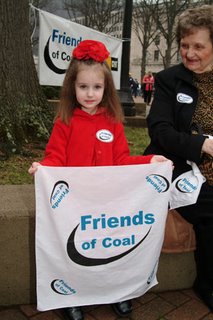
The latest intel from around the triple W and from around your back yard. A collaborative news service where we actually admit that we filter and hand pick what we want you to read, from the concerned folks at Buckeye Sustainability Institute
NOTE: This News section may contain portions of copyrighted material. In accordance with Title 17 U.S.C. Section 107, such attributed material is available without profit to people expressing an interest in this information for research.
12.26.2006
8.29.2006
Americans Link Hurricanes and Heat Wave to Climate Change
UTICA, NY, Aug. 24, 2006 - As Americans recover from this summer's heat wave and mark the first anniversary of Hurricane Katrina, an overwhelming majority say they are more convinced that global warming is happening than they were two years ago, and they are also connecting intense weather events like hurricane Katrina and heat waves to global warming, according to a new Zogby America telephone poll.
The survey, sponsored by the National Wildlife Federation, was conducted Aug. 11-16, and included 1,018 respondents. It carries a margin of error of +/- 3.1 percentage points.
Nearly three of every four – 74% – are more convinced today that global warming is a reality than they were two years ago, the survey shows. Dramatically, it is a sentiment shared by a majority of Democrats, Republicans, and political independents. While many more Democrats believe in global warming (87%), 56% of Republicans concur. Among independents, 82% think we are experiencing the effects of global warming. These numbers indicate a shift in the momentum of global warming believers.
Asked what influence global warming has had on specific weather events, 65% said they believe it had an influence on this summer's heat wave that baked the U.S., and 68% said they think it was a factor in development of more intense hurricanes like Katrina. Similar numbers are seen for other weather phenomenon including droughts, wildfires and snowfall.
"While the findings in this survey are not proof that intense weather events are linked to global warming, it is clear that Americans are making that connection," says pollster John Zogby. "It is also clear that there is a desire among Americans across the political spectrum to see steps taken to reduce greenhouse gases."
The survey also indicated there is strong support for measures to require major industries to reduce their greenhouse gas emissions to improve the environment without harming the economy – 72% of likely voters agreed such measures should be taken. That sentiment was consistent across a wide age spectrum of respondents, but there was some split along party lines. Among Democrats, 81% agreed major industries should be required to cut greenhouse gas emissions, while 61% of Republicans agreed. Among independents, 73% said major industries should be required to decrease certain emissions.
USDA Designates 20 Biobased Items for Federal Procurement
"The designation of these 20 biobased items is a major step in advancing the federal preferred procurement program for biobased products," said Agriculture Secretary Mike Johanns. "When finalized, 1,500 biobased products will be given procurement preference by federal agencies, generating new economic opportunities for biobased product producers and U.S. farmers and ranchers, while providing new choices for U.S. consumers."
The Federal Biobased Products Preferred Procurement Program is authorized under Section 9002 of the Farm Security and Rural Investment Act of 2002. USDA published the first final rule designating six items for preferred procurement in March 2006. Federal agencies must give preference to designated biobased products in government purchases within one year of publication of the final designation rule.
The two proposed rules to be published in the Aug. 17, 2006 Federal Register designate 20 items, which are generic groupings of biobased products. The new items include: adhesive and mastic removers, insulating foam for wall construction, hand cleaners and sanitizers, composite panels, fluid-filled transformers, biodegradable containers, fertilizers, metalworking fluids, sorbents, graffiti and grease removers, two-cycle engine oils, lipcare products, biodegradable films, stationary equipment hydraulic fluids, biodegradable cutlery, glass cleaners, greases, dust suppressants, carpets, and carpet and upholstery cleaners.
Technical information to support each proposed rule is available at the web site for the Federal Biobased Products Preferred Procurement Program at www.biobased.oce.usda.gov. USDA encourages interested parties to submit comments on the proposed rules during the 60-day public comment period following their publication. The web site also contains a catalog listing the qualifying biobased products that manufacturers have posted under each designated grouping of products.
The two proposed rules announced today are part of a series of rules that will be issued designating biobased items. USDA has identified about 170 items for which it is collecting test data needed for the additional designations of items that will extend preferred procurement status to include all qualifying biobased products.
USDA has previously issued final guidelines for the biobased procurement program and developed a model procurement program of training and education to help Federal procurement officials and users of biobased products identify and purchase qualifying biobased products. Information on the guidelines and the model program are available at www.usda.gov/biobased
5.10.2006
4.20.2006
2.20.2006
1.24.2006
Scenes from the Friends of Coal's latest BASH!
Ohio EPA BUSTS Boyer Signs and Graphics of Cleveland, Ohio
past hazardous waste violations and issued an administrative consent
order on January 13, 2006. The violations occurred at its facility
located at 21611 Tungsten Road, Euclid, Cuyahoga County, Ohio. The
settlement includes a $15,000 penalty of which $12,000 will be deposited
into the state's hazardous waste cleanup fund. In lieu of paying the
remaining $3,000 of the penalty, Boyer Signs & Graphics, Inc., will fund
a supplemental environmental project (SEP) by making a contribution in
the amount of $3,000 to the Ohio EPA Clean Diesel School Bus Program.
You can see the letter the OEPA sent to the bad guys
by clicking here
Ohio EPA BUSTS Accurate Plating Company of Cleveland, Ohio
hazardous waste violations and issued an administrative consent order on
December 19, 2005. The violations occurred at its facility located at
6512 Carnegie Avenue, Cleveland, Cuyahoga County, Ohio. The settlement
includes a $25,000 penalty of which $20,000 will be deposited into the
state's hazardous waste cleanup fund. In lieu of paying the remaining
$5,000 of the penalty, Accurate Plating Company will fund a supplemental
environmental project (SEP) by making a contribution in the amount of
$5,000 to the Ohio EPA Clean Diesel School Bus Program.
You can view the actual letter sent to the polluter by OEPA by clicking
here.
This letter provides you with the actual laws broken (with a regulatory citation) and typically an outline of the situation leading up to the settlement. You would not believe how few of these they send out. Now I understand why other states have privitized this a bit.
1.20.2006
When it pays to buy organic - Consumer Reports article summary
Full text of the CR organic article by clicking the title!
At BSI we try and buy local organic food from reputable sources. The closer the better.
1.09.2006
Pinnacle Gas Producers , LLC BUSTED by the Ohio EPA
You can see the letter the OEPA sent and read the dirty details by clicking here
1.02.2006
Colleges Boycott Coke Over Concerns
Sunday, Jan 01, 2006,Page 11
When students at the University of Michigan return to campus next week after the holiday break, they will find the Coke machines and fountain dispensers empty.
The university, which has 50,000 students on three campuses, on Thursday became the 10th college to stop selling Coca-Cola products because of concerns arising from accusations about the company's treatment of workers in bottling plants in Colombia and environmental problems in India.
A Coke spokeswoman, Kari Bjorhus, said on Friday in a statement that the company hoped the Michigan decision was temporary.
She said Coca-Cola was looking at ways to conduct an independent third-party study of the situation in Colombia.
Labor activists have said that Coca-Cola, through its Latin American bottlers, has been complicit in the deaths of eight union leaders and in continued harassment of unionized employees.
In India, a different group of activists have accused Coke of polluting the soil and groundwater near several bottling plants, of severely reducing groundwater levels in drought-prone areas and of failing to install adequate filtration systems that would remove pesticides from the water used to make its products.
The activists, led by two groups, Corporate Accountability International and the Campaign to Stop Killer Coke, have found a sympathetic ear on college campuses.
Within the last year, New York University, Rutgers University in New Jersey and Santa Clara University in California, among others, have stopped selling Coke products.
The University of Michigan had set yesterday as a deadline for Coke to select an auditor and agree on the terms of the investigation. But talks between the company and the university broke down.
Coke says the accusations about India are groundless.
The company says that its use of water in India has become more efficient and that it has begun harvesting rainwater to help return it to underground sources.
BSI Links to the Source to bring you what Coke has to say.






